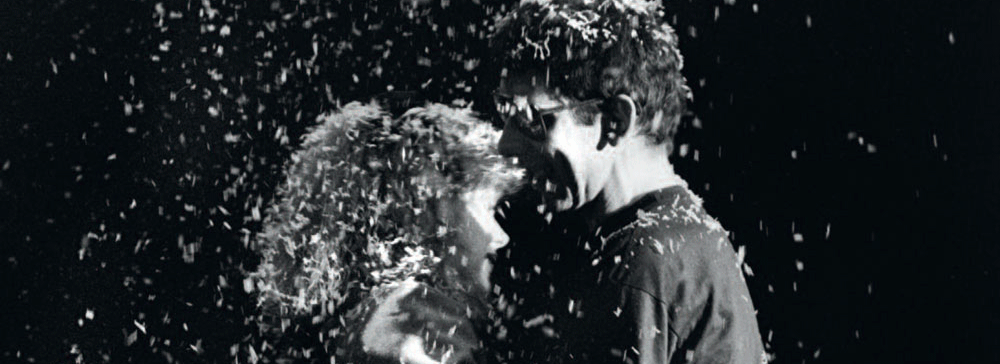Rob ‘The Loose Cannon’ Buchanan hates the word ‘faggot’, but he thinks anyone who wants to ban the use of it in ‘Fairytale of New York’ is a cheap, lousy one.
It’s that time of year when Christians celebrate the arrival of a new iPad and people decorate their living rooms with vomit and tears, as they gather together to share passive aggressive conversation, open old wounds and unwanted presents, and all to the soundtrack of some ubiquitous Christmas muzak. Sleigh bells ring, are you listening?
One of the most inescapable tunes of them all is ‘Fairytale of New York’ from The Pogues, featuring the tragically deceased Kirsty MacColl. Released in 1987, ‘Fairytale’ was both shocking and innovative due to its combination of old fashioned Irish balladry with the kind of gritty, drunken bawdy-song made popular by folk exports such as The Dubliners. The hybrid was a surprise global success.
It charts a comic-tragic exchange between two ‘frenemy’ lovers in a New York City drunk tank on Christmas Eve, along the way exposing the gap between the expectations of emigrants and alienating, poverty stricken reality. The song is an argument in itself, but every year it stirs up another argument altogether, between the straights and the gays, and the gays and other gays, over the use of a certain lyric.
Despite the song containing references to alcoholism, drug abuse, criminality, suicidality, and misogyny, there is one word above all others in the song that creates controversy among western audiences – faggot.
Now, I want to make one thing clear – I hate the word. I describe myself as ‘queer’, but I`ll take bender, puff, steamer, even gaybo any day over faggot. Words are important, especially the words we identify directly with our own self worth. If we are to listen to Mr Noam Chomsky, and I believe we should, words can mould our very perception of the world. A certain spin or delicately balanced emphasis can change our feelings about words, and the people we assign them to.
So, what’s so dangerous about the six-letter F word? With the broad, reductionist naming of things we don’t understand, we get a handle on the world. Naming the ‘other’ gives us control. It grounds us, and puts others in their place. When people who don’t understand or identify with homosexuals use the word, faggot, it allows them to disengage from the idea of homosexuality, whilst also classifying it as ‘less’ than them.
I find ‘faggot’ disparaging and offensive, but when I hear the word in an upbeat Christmas song while I push my shopping trolley full of beer around Tesco, do I find it disparaging and offensive? Of course not – it’s all about context.
Let’s examine where the word ‘faggot’ comes from. Originally it’s Latin for a bundle of sticks – ‘fascis’, from which we also get the word ‘facism’. But how could something as innocuous as a bundle of sticks evolve to have such complex meanings? Well, that ‘bundle of sticks’ was used both as a symbol of military and judicial might; when bound together they were used as a weapon of authority, as seen adorning many an ancient roman frieze. Hence facism.
But chillingly that ‘bundle of sticks’ was also used for burning – homestead fires, funeral pyres, and living people. Hence the pejorative ‘faggot’ was something useless for anything but burning. Faggots were synonymous with the burning of heretics, so much so that the phrase “fire and faggot” was used to indicate “punishment of a heretic”.
But it is unlikely that the modern use of ‘faggot’ as a homophobic term is related to this. It’s far more likely the association of the word as a dismissive term used to describe ugly old and hence ‘worthless’ women. These dependants had to be carried physically and financially, like a bundle of sticks. ‘Faggot’ also became popular in 18th century term in English public schools, for younger boys whow were used like skivvies, often for sexual exploitation, by older boys. This was a submissive and intermediate role, considered part of the evolution from being a youth (feminine) to becoming a man (masculine).
In my opinion the horrible thing about ‘faggot’ is not its vulgarity; its the dismissiveness with which it’s used. It is a thought terminating cliché that instantly reduces and de-humanises. Faggots are targets for whatever violence or disrespect an opponent to equality can level at them, and this can be done guilt-free. To me, it is the verbal equivalent to me of the pink triangle concentration camp badge from the Nazi holocaust.
Whilst a few queer theorists have embraced and tried to re-appropriate the word for the positive cause of gay rights and identity, to the majority of people it is still a vulgarity that invites exploitation, derision and disrespect. But words in and of themselves have no meaning. It is the connotations behind them and the context in which they’re used, that defines them.
In the case of ‘Fairytale of New York’, neither the connotation or context is homophobic. It would be a travesty to edit or censor the word in the song, because of misdirected sensibilties, which I might add are as likely to come from liberal, heterosexual political correctness, as from outraged queers. The joy of the song is that it’s an antidote to the camp, superficial cartoonish Christmas standards. To reduce it to an argument over a single word is as ignorant and dismissive as the term ‘faggot’ is itself.
‘Fairytale of New York’ is social commentary. It’s a song about dreams pissed up against the wall; about people who you can’t stop loving despite all the heartache they cause. It’s about how the dramas of life take place against the backdrop of drink and drugs. It is not a song about homophobia. Get over it. Anyone who says it is deserves to be locked up, like the cheap lousy faggot they are.
© 2013 GCN (Gay Community News). All rights reserved.
